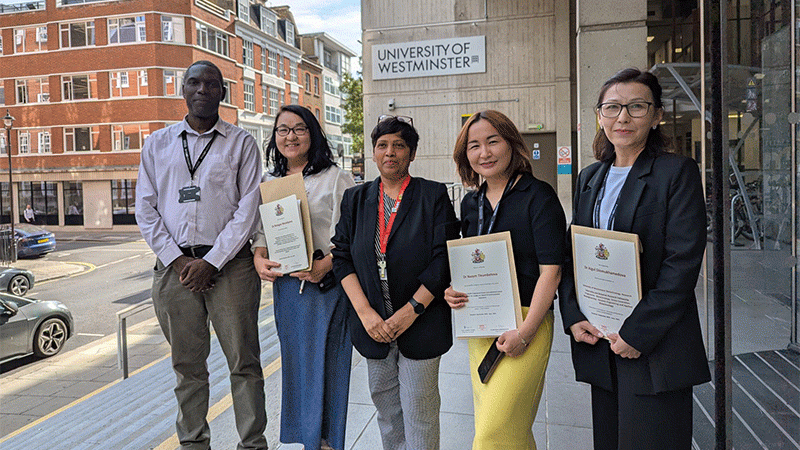The second cohort of Bolashak researchers from Kazakhstan have completed the University of Westminster’s Biotechnology Research Internship Programme under the prestigious Bolashak International Scholarship. Their work focused on advancing global health and environmental solutions through biotechnology innovations, reflecting Westminster’s commitment to international research partnerships and innovation.

The scheme, hosted by the School of Life Sciences from September 2024 to June 2025, provided a structured and collaborative research environment for three research fellows. The researchers undertook supervised, independent research projects in areas such as sustainable biotechnology and genome engineering. The internships were supported by members of the Sustainable Biotechnology Research Group (SBRG) and the Genome Engineering Laboratory, who provided masterclasses and workshops in biotechnology, one-to-one mentorship, access to laboratory facilities, opportunities for engagement with wider institutional activities as well as an exclusive training on the University’s Gene Editors of the Future programme.
Dr Botagoz Mutaliyeva from Muktar Auezov South-Kazakhstan University was supervised by Professor Godfrey Kyazze, Professor of Sustainable Bioprocess Engineering and Co-Leader of the SBRG, and Professor Taj Keshavarz, Professor of Biotechnology. Together they worked on two projects, exploring firstly how certain enzymes from fungi can break down plastic materials and secondly ways to prevent soft rot disease in tomatoes by interrupting the way harmful bacteria communicate.
Dr Aigul Dinmukhamenova from the Department of General Biology and Genomics at L.N. Gumilyov Eurasian National University, and Nazym Tleumbetova, from Kazakhstan National Reference Laboratory for the Control of Viral Infections, carried out research under the supervision of Dr Kalpana Surendranath, Leader of the Genome Engineering Laboratory and Co-organiser of the programme. Their work focused on creating new lab models of breast and colorectal cancer using advanced gene-editing technology CRISPR to better understand how environmental factors might influence cancer development. They particularly looked at how two important genes, Epidermal Growth Factor Receptor (EGFR), which helps cells grow, and Kirsten rat sarcoma virus (KRAS), which can drive cancer when mutated, are affected by these exposures.
During their time at Westminster, the researchers also participated in research seminars, public engagement events and masterclasses on persuasive grant writing and academic publishing - skills critical for success in a competitive global research landscape.
The programme was made possible through the Center for International Programs JSC, which administers the Bolashak International Scholarship - a long-running initiative funded by the Government of Kazakhstan to develop global research leaders through overseas training.
Professor Kyazze, who coordinated the scheme at Westminster, said: “It has been a privilege to host this talented group of researchers and support their professional development. They brought fresh insights and ambition to our School and we look forward to seeing how they translate their experience into impact back in Kazakhstan.”
Dr Surendranath added: “Sustained collaboration with the Bolashak scholars has enriched our research and research-engaged teaching activities by introducing novel perspectives. The scholars have achieved significantly in their research projects and we are committed to building upon these collaborations to develop future opportunities.”
This Internship Programme directly contributes to the United Nations Sustainable Development Goals (SDG) 2: Zero Hunger, 3: Good Health and Wellbeing and 12: Responsible Consumption and Production. Since 2019, the University of Westminster has used the SDGs holistically to frame strategic decisions to help students and colleagues fulfil their potential and contribute to a more sustainable, equitable and healthier society.
Explore the Biological and Biomedical Sciences courses at the University of Westminster.





